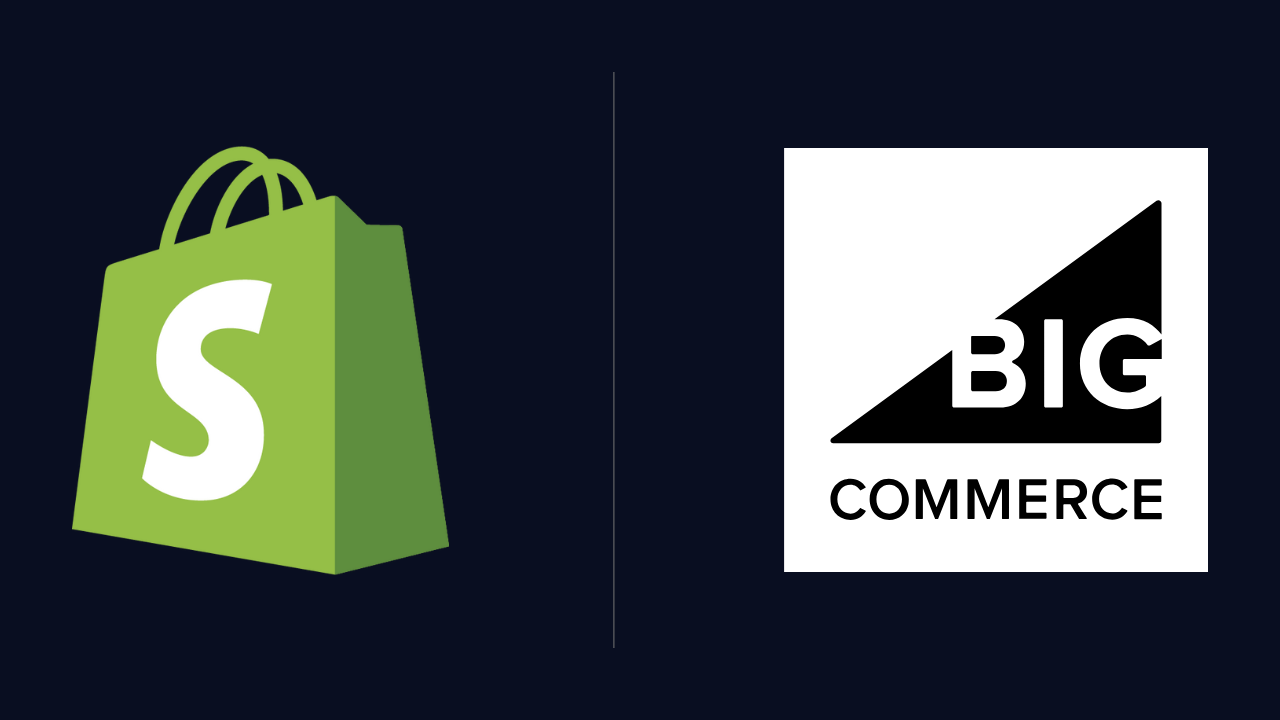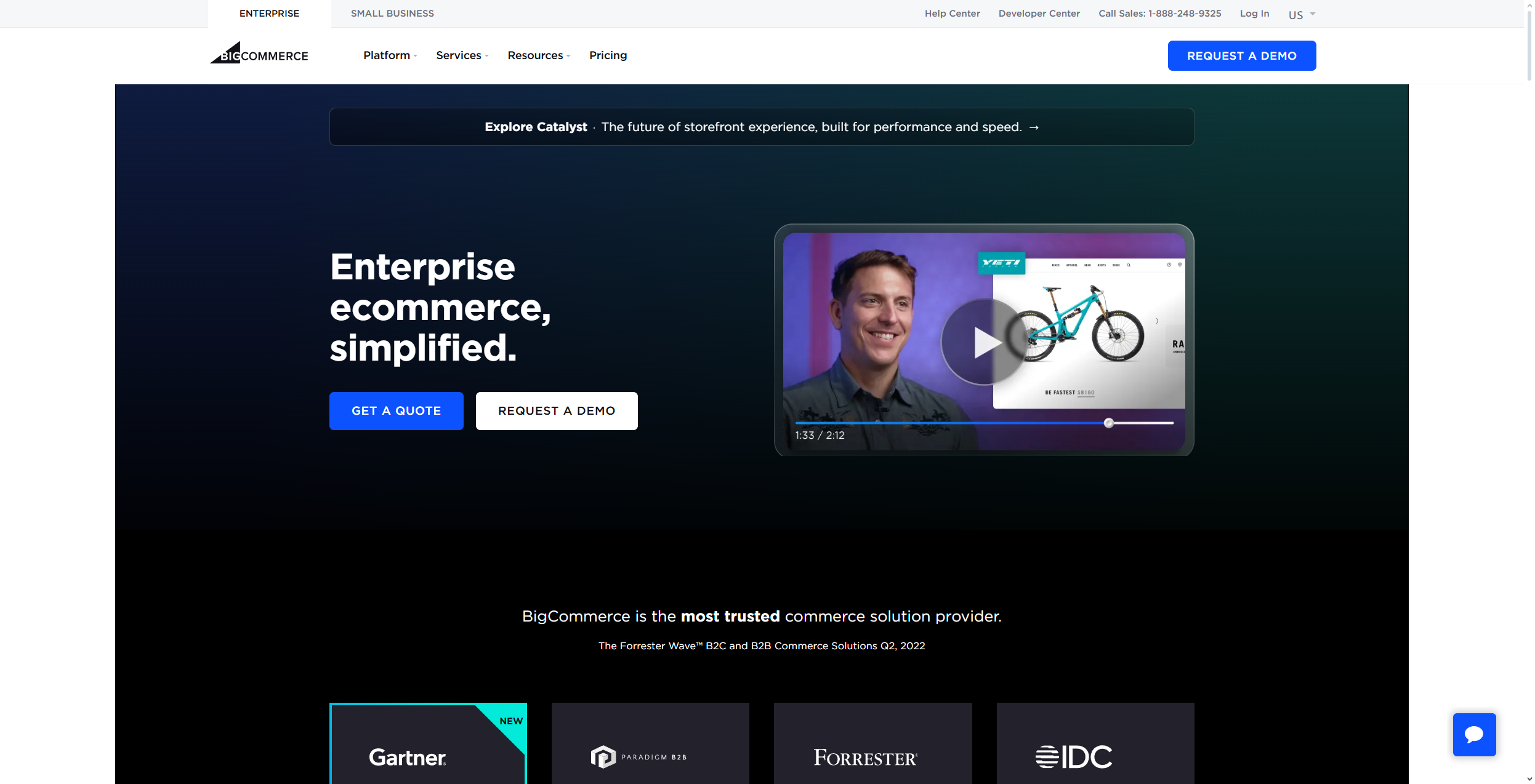Shopify vs BigCommerce: Which ecommerce platform is the best?
Comparing the online commerce giants

Shopify remains one of the best ecommerce platform choices in 2025, hosting millions of online stores globally with its simple interface and complete feature set. The platform just enhanced its capabilities with the Winter 2025 Edition, providing simpler operations and improved customer experiences to increase sales. With its native AI features such as Shopify Magic for product descriptions and thousands of apps, Shopify remains a great choice for businesses of all sizes.
BigCommerce is Shopify's closest competitor, with its powerful native features and no transaction fees on any plan. The platform's excellent entry-level features include unlimited products, staff accounts, and bandwidth, making it highly sought after by businesses seeking an all-in-one solution without needing many add-ons. BigCommerce's recent focus on AR integration and voice commerce demonstrates its commitment to ecommerce innovation leadership.
Both platforms have similar pricing plans, but they are differently positioned in the market according to individual strengths. Shopify is extremely simple to use and has more apps, making it ideal for businesses that need fast setup and growth. BigCommerce is different with more native features and variable payment plans, making it appealing to merchants that desire full features immediately.
Shopify leads the ecommerce platform market with its intuitive interface and extensive customization options. The platform excels in providing a user-friendly experience while offering powerful features through its extensive app marketplace. Its recent AI integration and enhanced performance updates make it particularly attractive for businesses prioritizing growth and scalability.
For
- Extensive app marketplace
- User-friendly interface
- Powerful AI integration
- Excellent mobile optimization
- Fast checkout process
Against
- Transaction fees for third-party
- Limited built-in features
- App costs add up
- Basic SEO features only
- Theme customization can be restrictive
BigCommerce distinguishes itself with comprehensive built-in functionality and enterprise-grade features. The platform offers robust out-of-the-box capabilities, eliminating the need for numerous add-ons, while maintaining strong B2B features and multi-channel selling capabilities.
For
- No transaction fees
- Comprehensive built-in features
- Strong B2B capabilities
- Unlimited staff accounts
- Advanced SEO tools included
Against
- Steeper learning curve
- Limited theme selection
- Sales thresholds force upgrades
- Complex interface for beginners
- Fewer integration options
Feature | Shopify | BigCommerce |
|---|---|---|
Ease of Use | Very intuitive with user-friendly editor | Moderate learning curve with more technical features |
Transaction Fees | Applies fees for third-party payment processors | No transaction fees on any plan |
Built-in Features | Basic features with extensive app marketplace | More comprehensive built-in functionality |
Payment Gateways | 100+ payment methods | 65+ integrated payment options |
Themes | Larger selection of modern themes | Limited but customizable themes |
Staff Accounts | Limited based on plan | Unlimited on all plans |
Multichannel Selling | Integration with major marketplaces and social media | Built-in integration with Amazon, eBay, Walmart, social channels |
SEO Features | Requires some apps for full capabilities | Comprehensive built-in SEO tools |
Inventory Management | Basic tracking and management tools | Advanced native inventory system |
Analytics | Basic reports on lower plans, advanced on higher tiers | Comprehensive reporting across all plans |
API Access | Limited on basic plans | Unlimited API calls on Enterprise plan |
Customer Support | 24/7 support with additional social media support | 24/7 support via phone, chat, and ticket system |

Shopify vs BigCommerce: Features
Shopify is a full ecommerce solution with more than 6,000 apps in its app store, which provides ample customization and additional functions. The platform excels at core ecommerce features, with unlimited products, inventory management, discount codes, cart abandonment recovery, and support for more than 100 payment gateways. Shopify's AI feature, Shopify Magic, provides advanced features such as automatic product descriptions and additional customization options.
The platform's multi-channel selling feature is extremely strong, with seamless integration with large marketplaces and social media platforms. Shopify's checkout feature is extremely streamlined, with features such as Shop Pay, which offers one of the best checkout experiences on the web.
BigCommerce excels as it has ample built-in functionality, which translates to fewer third-party apps compared to Shopify. The platform has high-end features as a standard, such as multi-currency support, real-time shipping rates, and bulk pricing rules. BigCommerce's native functionality also includes advanced features such as faceted search, bulk 301 redirects, and greater control over URLs.
BigCommerce's multi-channel integration is extremely comprehensive, with pre-built connections to marketplaces such as eBay, Amazon, and Walmart, and social media platforms such as Facebook, Instagram, and Pinterest. The platform supports more than 65 integrated payment methods and provides strong analytics tools for monitoring website performance, conversion rates, and revenue.
Comparing the features of the two platforms, BigCommerce offers more complete functionality out of the box, which can save long-term expenses and make things simpler. Shopify offers similar features, but many of the advanced features require additional apps. However, its larger app ecosystem provides more flexibility to achieve specific objectives.
Shopify vs BigCommerce: Ease of use
Shopify is easy to use, with a clean interface that got better in 2025. The website has a neat and organized dashboard and a step-by-step installation guide, which makes it extremely easy to use for beginners. Even less technically savvy users can start and run their stores with little help.
BigCommerce is a bit more complicated at first, but it has improved significantly in 2025. The website has a less complicated installation process and a cleaner dashboard, but it has many features. This results in users having more options and settings to adjust when getting started. But, having more in-built features is a positive because users don't need to install additional apps to get things done.
Overall, Shopify is a bit simpler to use, especially for total beginners. But, BigCommerce's larger set of in-built features might make things simpler in the long run by allowing fewer apps and integrations.
Shopify vs BigCommerce: Customer support
Shopify revamped its support system in 2025. It ended the practice of using phone and email support and went AI-first. Currently, the primary means of accessing support is through an AI assistant on the Help Center. There is no direct phone support, but the AI assistant is accessible 24/7 online. For more complex issues, Shopify's AI can refer users to human advisors. Social media support and community forums are also available.
BigCommerce offers full 24/7 support through several channels, including chat, email, and US-based phone support. The platform has a reputation for high-quality technical support staff, who are experts at solving complex issues. Advanced plan customers receive more personalized support, which is invaluable for large organizations.
When comparing the support systems of the two platforms, BigCommerce offers a more superior and convenient customer service solution. Although Shopify's AI-first system might provide faster initial responses, BigCommerce's support channel mix and high technical capability provide more in-depth assistance, particularly for organizations that need full technical support.
Shopify vs BigCommerce: Security
Shopify has strong security features on the platform, such as SSL encryption and DDoS protection. Recently, it enhanced its security features by transitioning to hCaptcha for increased protection against bot attacks and utilizing stronger authentication forms. Shopify's security system features numerous fraud protection tools and AI-driven risk assessment capabilities.
The platform also enhanced its authentication process for its users in 2025, through unified verification on sensitive actions such as deleting employees' accounts or modifying billing information. Shopify's fraud analysis tools have been significantly upgraded, offering sophisticated risk assessments to merchants for discovering and preventing fraudulent transactions.
BigCommerce shows dedication to security by being PCI DSS Level 1 compliant and having a multi-layered approach to security on Google Cloud Platform infrastructure. The platform offers continuous 24/7 monitoring, perimeter firewalls, and broad protection against any cyber threats. BigCommerce has advanced security features such as rate limiting measures and suspicious activity checks.
The platform has made remarkable security enhancements in 2025, such as advanced permission levels for controlling users' access and enhanced API security measures. BigCommerce also adheres to rigid vulnerability management programs and routine security audits to assure continuous protection for merchant and client data.
Between security features, both platforms deliver strong protection but in different manners. While Shopify concentrates on AI-based security components and automated threats, BigCommerce focuses on security infrastructure and standards compliance. Both platforms offer sound security foundations, although BigCommerce's enterprise permission levels and sophisticated security controls will be more suited to large organizations with complex security needs.

Shopify vs BigCommerce: Tools, add-ons, and extras
In 2025, Shopify has greatly increased what it offers, with over 6,000 apps in its marketplace and utilizing AI through Shopify Magic. The Winter 2025 Edition introduced over 150 new features, including AI tools for product descriptions and greater options for customization. Support is also addressed with an AI focus, including an AI assistant in the Help Center that can send difficult problems to human advisors if needed.
Shopify's recent platform updates have also improved core functionality. There is a 50% increase in how fast carts load, checkout buttons are 58.8% faster, and admin load speeds are 25% better. The platform now supports up to 25 active automatic discounts, up from 5 before, and has enhanced B2B features like price locking and custom bundles.
BigCommerce is noted for its strong built-in capabilities and strong B2B features. The B2B Edition includes tools for corporate account management, invoice portals with multiple payment methods, and tools for sales representative management. BigCommerce has also added AI tools like BigAI Copywriter for product descriptions, AI-driven product recommendations, and predictive analytics for customer value over time.
Recent platform updates include the addition of Catalyst and Makeswift, which allows for easier store creation and visual changes without needing heavy development. BigCommerce has also increased its widget limit per store from 10,000 to 100,000, giving merchants more freedom to customize stores.
When comparing additional features, both platforms have excelled in customization features and AI integration. Shopify leads with its rich app ecosystem and AI-first approach, while BigCommerce leads with its feature depth and B2B functionality, potentially reducing additional app and integration requirements.
Shopify vs BigCommerce: Hardware
Shopify has adaptable hardware options for its POS system, with costs ranging from $0 to $2,000 with software, hardware, and installation fees. The platform has buy, lease, or rent options for POS hardware, with cash drawers at $129 or $139 and card readers at $49 to $349. The system supports legacy POS systems and mobile POS options that can be installed on iOS or Android devices.
BigCommerce's hardware foundation is built on Google Cloud Platform, which provides robust security and scalability. The platform supports full server management, including updates, patches, and load balancing, so merchants can focus on business expansion without infrastructure maintenance. In terms of POS support, BigCommerce usually asks customers to partner with other providers like PayPal, Zettle, or Square, instead of offering them in-house.
When comparing hardware features, Shopify provides more comprehensive retail-focused hardware solutions with adaptable buying options, while BigCommerce emphasizes cloud infrastructure and backend capabilities. This is a reflection of its respective strengths, with Shopify being ideal for businesses with at least some physical retail needs and BigCommerce focusing on robust online operations.
Shopify vs BigCommerce: Pricing
Shopify offers tiered pricing with 3 primary plans: Basic Shopify at $39/month ($29/month annually), Shopify at $105/month ($79/month annually), and Advanced Shopify at $399/month ($299/month annually). Each plan has increasingly more functionality and lower transaction fees, from 2.9% + $0.30 for Basic to 2.5% + $0.30 for Advanced when paying with Shopify Payments. Third-party payment processors incur additional transaction fees.
BigCommerce replicates Shopify's framework with Standard at $39/month ($29/month annually), Plus at $105/month ($79/month annually), and Pro at $399/month ($299/month annually). The biggest difference is that BigCommerce does not charge transaction fees on top of payment gateways. BigCommerce does impose sales limits, though, that can compel upgrades to higher levels - Standard supports up to $50,000 in yearly sales, Plus up to $180,000, and Pro up to $400,000.
BigCommerce is less expensive for most businesses due to the absence of transaction fees and more extensive built-in features, which can eliminate the need for paid add-ons. Shopify's pricing, however, is better when paying with Shopify Payments, and its annual payment terms provide a material discount of up to 25% for all plans.
Shopify vs BigCommerce: Final verdict
Based on the general overview of features, usability, support, security, tools, and prices, Shopify leads with its ease of use and vast app store, making it perfect for beginners and small businesses expanding. Meanwhile, BigCommerce provides better built-in functionality and no transaction fees, making it better suited for established businesses looking for end-to-end out-of-the-box capability.
The decision between the two, therefore, depends on specific business requirements, with Shopify leading in customizability through apps and BigCommerce providing better native capability.
Are you a pro? Subscribe to our newsletter
Sign up to the TechRadar Pro newsletter to get all the top news, opinion, features and guidance your business needs to succeed!

Ritoban Mukherjee is a tech and innovations journalist from West Bengal, India. These days, most of his work revolves around B2B software, such as AI website builders, VoIP platforms, and CRMs, among other things. He has also been published on Tom's Guide, Creative Bloq, IT Pro, Gizmodo, Quartz, and Mental Floss.
You must confirm your public display name before commenting
Please logout and then login again, you will then be prompted to enter your display name.